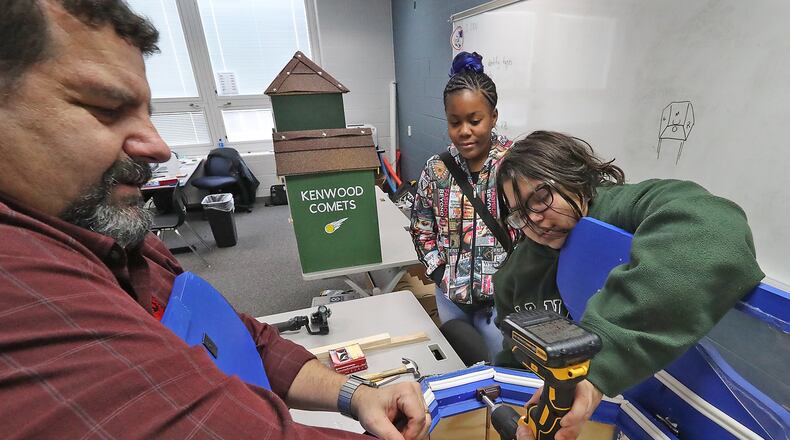In December, the Springfield Foundation donated $15,000 to the organization. Their donation will go directly to the construction of new Houses of Knowledge — “little library”-style structures that can hold up to 100 books at a time.
READ MORE: Springfield St. Vincent de Paul feeds hundreds for holidays
The organization plans to install about a dozen Houses of Knowledge around the city of Springfield and might put up a handful in Dayton, Mbeseha said.
Right now, two Houses of Knowledge are up and operational — one in front of Marshall’s Springfield home and one in the Auburn J. Tolliver Community Peace Garden on South Limestone Street.
The latter also serves as the prototype for their Reading Parks Project. After putting up more Houses of Knowledge, Marshall said, they hope to outfit the spaces around them as reading areas, with park benches and lighting.
Since its founding in 2015, the community has seen the organization’s impact: The Conscious Connect will be recognized as an Outstanding Creative Youth program at Springfield’s annual Martin Luther King luncheon on Jan. 12.
DETAILS: Feed the Hungry program expands to Springfield, delivers meals
Marshall and Mbeseha, both 26, first met while attending Wittenberg University, Marshall for philosophy and Africana studies and Mbeseha for political science and Africana studies. They wanted to think of a way to directly affect the education of local kids, Marshall said.
Looking back at their own childhoods and paths to success, they found a clear constant: reading.
“Literature and reading were a big part of both of our upbringings,” said Mbeseha, who had a penchant for biographies as a kid. Reading them helped him envision what he could accomplish one day, he said.
The more kids had access to high-quality, relevant literature, they believed, the more opportunities they would have.
“To be able to read is a right, we believe,” Marshall said. “That’s really beyond education and that’s a social justice issue.”
MORE COVERAGE: As temperatures drop, Springfield shelters fill
New York University literacy education researcher Susan B. Neuman has co-authored two studies comparing wealth disparities and access to books. In the first study, published in 2001 by Reading Research Quarterly, Neuman found that a child in a middle-class Philadelphia community had access to about 13 age-appropriate books. In an impoverished community in the same city, there was only one appropriate book for every 300 children.
Though Marshall and Mbeseha didn’t have exact data on the availability of books in the Miami Valley, they saw a clear need.
They first put their concept into action in January 2016 by placing books in local barber shops and salons. Today, The Conscious Connect has supplied books to more than 65 barber shops and salons, about 50 of which are in Dayton, Springfield and Trotwood.
The organization focused on stocking books that either have black main characters or black authors.
“It’s very important that children, and even adults, can see themselves reflected in the stories that they’re reading,” Marshall said.
RELATED: Literacy initiative aims to eliminate book deserts
Marshall also hopes to help shift the culture and perception of reading. It can’t just be about improving test scores, he said. Children and adults need to want to read.
“We think it’s fundamentally important that reading isn’t a chore,” Marshall said. “Reading needs to be enjoyable.”
To expand their programs, the organization has been working closely with Springfield schools.
In the fall, David Zeller, a teacher at Hayward Middle School, was trying to find a project for his Design and Modeling class that would allow his students to help to solve a problem in the community.
“I thought about how our students many times don’t have easy access to reading material or even transportation to the public library to get things to read over summer and winter breaks,” Zeller said.
READ MORE: Clark County library finishes $2.6M renovations
When Zeller was connected with Marshall and Mbeseha, who already had plans to install the boxes at Springfield elementary schools, they decided Zeller’s students would design and build the Houses of Knowledge for Hayward’s elementary feeder schools.
Students were divided into teams and each submitted designs to their assigned schools. Principals or student councils at each school chose their favorite design, and the students spent the final two weeks of classes before their winter break building, assembling and painting the boxes.
The organization is still actively seeking other businesses and organizations to contribute, Marshall said. Individuals can also get involved by donating — either money or books — or volunteering to distribute books or build new Houses of Knowledge.
By the numbers:
65: Barber shops and salons The Conscious Connect has supplied with books
100: Books that one House of Knowledge can hold at one time
$15,000: The Springfield Foundation’s donation to The Conscious Connect
About the Author
